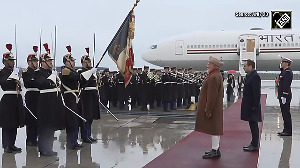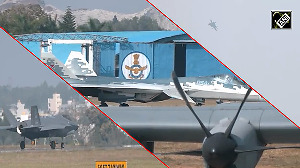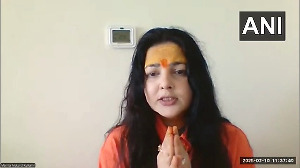
V Balachandran, one of the most respected intelligence officials in the country, assesses the national security challenges confronting the Manmohan Singh government in a three-part series exclusive to rediff.com
Part I: The Domestic Challenge
Part II: Needed: An Effective National Security Council
A massive global project on the likely trends for 20 years (NIC 2020 Project) was undertaken by the American National Intelligence Council, the equivalent of our Joint Intelligence Committee, with the participation of several experts outside the field of intelligence. The 'discussion paper' released in November 2003 with a caveat that it did not reflect the US government's views sounded like Armageddon while detailing the projections for South Asia which included the possibility of an Indo-Pak nuclear war.
American strategists have similarly been obsessed over the danger of a nuclear war between both countries, justifying outside intervention. Based on this, the US policy even after the 1998 nuclear explosions has been to apply the logic of non-proliferation and use pressure on both countries to accept safeguards. By the same token, American policymakers, who are so worried about terrorists getting nuclear know-how, should have been quite concerned over A Q Khan's escapades but they were not, as revealed by Colin Powell's stand in February disagreeing with Yashwant Sinha over the effects of Khan's proliferation activities, about which RAW has been warning since the 1980s.
Listing our opponent's military capability and raising alarm is an amateurish way of security analysis. However, this is what the NDA government did soon after assuming power. In April 1998 George Fernandes made a statement that China posed the biggest threat to India. Soon thereafter, the prime minister's letter to then US President Bill Clinton justifying the Pokharan II tests on the Chinese threat had leaked in the US press.
Then home minister L K Advani conducted his own diplomacy against Pakistan in June 2000 by undertaking a visit to Israel with an unusual retinue of all the intelligence chiefs, who do not expose themselves publicly, to learn from that country how to cope with our own terrorism. It is a different point whether the Israeli help had in any way diminished our security problems with Pakistan or reduced the terrorist killings, which according to official figures show no major sign of abating even this year despite the peace initiative with Pakistan.
Also Read: B Raman on National Security and the new government
The Pakistani capability of creating problems for India is well known. It is a sham democracy with the military dominated national security council overlording the elected government. All Pakistani governments including the elected ones had enlisted the support of fundamentalists for their objectives. But that does not mean that we cannot live in peace with Pakistan without being prodded by others.
The NDA strategy of initially confronting Pakistan did not work. They had to change tack under American pressure. The double dose of hard line policy of visa restrictions, banning over flights, thinning down of the diplomatic staff and massing of troops on the Pakistan border in the wake of the attack on Parliament on December 13, 2001 did not deter further Pakistan adventurism or terrorist incidents in Jammu and Kashmir.
By now it is fairly clear that Musharraf banned the Lashkar-e-Tayiba and Jaish-e-Mohammad on January 12, 2002 only due to US pressure and not due to Operation Parakram, which to quote General Padmanabhan, then Chief of the Army Staff, was rendered ineffective by 'lack of clarity within the Union Cabinet.'
At the same time the NDA government's policy of befriending the US with the main intention of making Pakistan irrelevant to that country, also did not work. At times this took a bizarre turn like Brajesh Mishra attempting to be a spokesman of the US president in September 2002 to announce that Bush had a 'hard message' for President Musharraf when no such confirmation came from the White House spokesman.
The NDA government also tried sending strategic experts including retired intelligence officers to garner Congressional sympathy by giving public testimony to different US Congressional committees to expose Pakistani terrorism, a step not favoured by earlier Congress party governments as indication of being subservient to the US organs of power.
Two steps the new UPA government took have created confidence in the sub-continent thirsting for peace. First, was the continuation of N N Vohra as the interlocutor with the All-Parties Hurriyat Conference, although the timing of future talks is uncertain because of the recent violence in Jammu and Kashmir. The next was the confirmation of the dates of the 'Composite Dialogue' on nuclear Confidence Building Measures and foreign secretary-level talks indicating that the peace process was a national agenda.
Along with this we should also build up a 'peace lobby' in Pakistan. The powerbrokers in Pakistan like the army, Muttahida Majlis-e-Amal, intelligence and bureaucracy do not stand to gain by peace. It is the majority middle class, intelligentsia and divided families who suffer the maximum by strained relations. They have no say in governance. We need to cultivate this segment for acting as a pressure group. The best way to marginalise a repressive regime is by opening the doors of escape as Western Europe did during the Cold War.
Trade is the biggest attraction to ensure a peace lobby. A well researched article by Nisha Taneja in the Economic and Political Weekly (January 24, 2004) states that Indian exports to Pakistan was $219 million in 2001 even in adverse circumstances. Informal trade through third countries (Dubai, CIS, Afghanistan) was placed at $2 billion. Pakistan can earn transit revenue of $600 million to $800 million a year if the energy pipeline materialises. Vigorous bilateral trade results in a vested interest in peace.
Nepal presents a security challenge to the new government. Sher Bahadur Deuba has been reappointed as the new prime minister and he is trying to win the confidence of the king, political parties and the Maoists. Foreign Minister K Natwar Singh's first foreign visit to that country underscored the importance of Nepal in our foreign policy calculations and also the anxiety not to lose the initiative either to US or China in helping to stabilise the internal situation. This task is not going to be easy.
It is not known what the reaction of the political parties or the Maoists to Deuba will be. The Maoists, who wanted to head the interim government in 2003 at the time of the ceasefire talks, are reported to have extended their control even more. They had raised strong objection to any Indian help in bolstering Nepalese defence forces and it remains to be seen what will be their reaction over Natwar Singh's reported assurance to extend security cooperation.
Yet another problem which will engage Delhi is the impasse in the final repatriation of nearly 100,000 Nepali-speaking Bhutanese refugees living in Nepal and the request of both countries to use Indian good offices for a solution.
We have no immediate security problems with China and the dialogue is proceeding smoothly. We need the help of Myanmar's military regime to stabilise our North East. Our security concerns with Bangladesh are over the sanctuaries given to the fundamentalists and separatists like ULFA although Bangladesh Foreign Minister Morshed Khan said on June 5 that his talks with Natwar Singh were highly satisfactory. Bangladesh is yet to give a satisfactory explanation over the recovery of a huge haul of armaments in that country in April.
In Sri Lanka, the Tigers have already expressed their opposition to any Indo-Sri Lankan defence cooperation. The growing strength of the Sea Tigers -- the LTTE's naval wing -- in the Palkh Bay should be a concern for both India and Sri Lanka.
V Balachandran retired as former special secretary, Cabinet Secretariat, Government of India
Photograph: Jewella C Miranda. Image: Uday Kuckian






 © 2025
© 2025